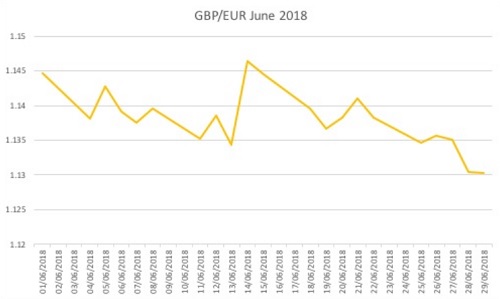Sterling/Euro Exchange Rate Review June 2018
Friday 06 July 2018
The pound to euro exchange rate declined in June, as markets weighed Brexit developments and European politics against a global backdrop of trade tensions writes Ben Scott of FC Exchange.
Political Instability Weighs
On the first day of June, Spanish Prime Minister Mariano Rajoy was ousted from his post in a no-confidence vote. The development bolstered the pound to breach the 1.14 level against the euro on the political uncertainty it created.
Also supporting the pound was the UK manufacturing figure which showed an upswing from 53.9 to 54.4 and buoyed hopes that the sector was showing a promising turnaround.
However, when looking closely at the details, it wasn’t all good news. IHS Markit Director Rob Dobson commented: ‘A slowdown in new order inflows meant the expansion in production was achieved only by firms working through their backlogs of work. Weaker than expected sales meanwhile led to the largest rise in unsold stock in the survey’s 26-year history. This suggests that manufacturers have yet to fully adjust their production to the weakening trend in new business growth and there will need to be a rapid improvement in demand if output volumes are to be sustained in the coming months.’
Meanwhile, the Eurozone was also dealing with the news that Italy might face fresh elections, which didn’t help the single currency gain any ground. Despite some concerns, the new anti-establishment coalition successfully took control of the country, offering some direction.
There were also concerns that Italy may have its own referendum on EU membership in the future, but the newly appointed government stated it had no intention of abandoning the single currency. Interestingly, a recent survey showed that only 34% of Italians had faith in the EU, while 56% said they didn’t. However, if a Brexit-style referendum seemed to be on the cards, 55% would vote to remain in the currency bloc.

Eurozone Slowdown?
Investors are watching for any sign of a slowdown in the Eurozone after recent data, and there were a few disappointing pieces in June.
German industrial production slipped to 2.0% in April, rather than coming in at the 2.8% forecast after March’s 3.2%.
Sentiment in the Eurozone also took a hit, when the latest ZEW German current situation survey dipped from 87.4 to 80.6.
The German expectations survey also took a tumble further into contraction, from -8.2 to -16.1.
As a whole, the ZEW Eurozone sentiment reading registered a fall from 2.4 to -12.6.
The figures allowed the pound to rise against the euro, on their release on June 12th.
In more positive news for the Eurozone, Germany’s unemployment rate fell from 5.3% to 5.2%, while the nation’s inflation climbed from 1.6% to 2.2% on the year in May.
Preliminary estimates suggest that consumer prices in the Eurozone as a whole reached 2.0% in June on the year, with oil’s 8% surge in the past twelve months helping to buoy the figure.
The preliminary estimate printed on June 29th and saw the pound tumble against its currency counterpart to 1.1257.
Bank of England and European Central Bank Expectations
Another exciting development for the pound came when Bank of England (BoE) Chief Economist Andy Haldane opted to vote for higher interest rates.
When the event took place on June 21st, sterling jumped against other majors as the vote stood at 6-3 to keep interest rates on hold. The minutes read: ‘Three members favoured an immediate increase in Bank Rate. These members had a higher degree of confidence that the slowdown in Q1 was temporary or erratic and would largely be unwound.’
The European Central Bank dragged the euro down in June when it stated that it would be keeping interest rates on hold for longer, despite announcing it would be phasing out quantitative easing.
GBP/EUR Exchange Rate Forecast
Looking ahead, UK economic data will be closely watched, and investors will be looking for pieces that could encourage more policymakers to vote for a hike.
Some of the key pieces to look at will be the latest employment change and average weekly earnings stats on Thursday 17th July.
The inflation rate on Wednesday 18th will also be another influential ecostat.
Any positive gross domestic product readings could prop up the pound as the second quarter estimates come in.
July will also see the second round of the BoE credit conditions and bank liabilities surveys published which may prove interesting for the British currency.
Brexit is continually influencing sterling, and the June summit saw Theresa May fail to reveal her Brexit blueprint, and instead received criticism from the EU that the UK needed to outline exactly what it wanted.
Meanwhile, the euro could also feel the impact of political instability if any disruptions come up, including the threat of trade war tariffs from the US.
Domestic politics in the Eurozone could be another factor that influences sterling with Angela Merkel’s position in Germany looking less stable than investors in the euro would like.
Ben Scott
FC Exchange
Thank you for showing an interest in our News section.
Our News section is no longer being published although our catalogue of articles remains in place.
If you found our News useful, please have a look at France Insider, our subscription based News service with in-depth analysis, or our authoritative Guides to France.
If you require advice and assistance with the purchase of French property and moving to France, then take a look at the France Insider Property Clinic.





